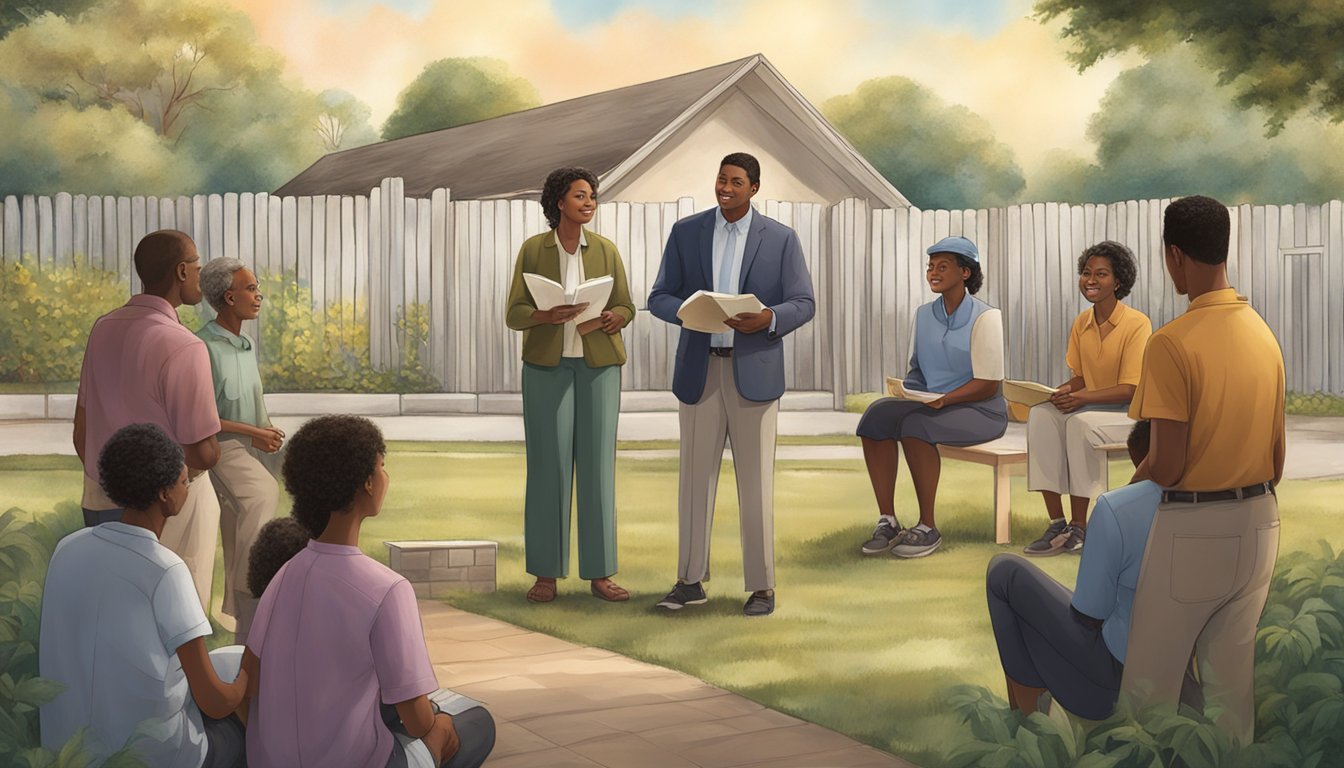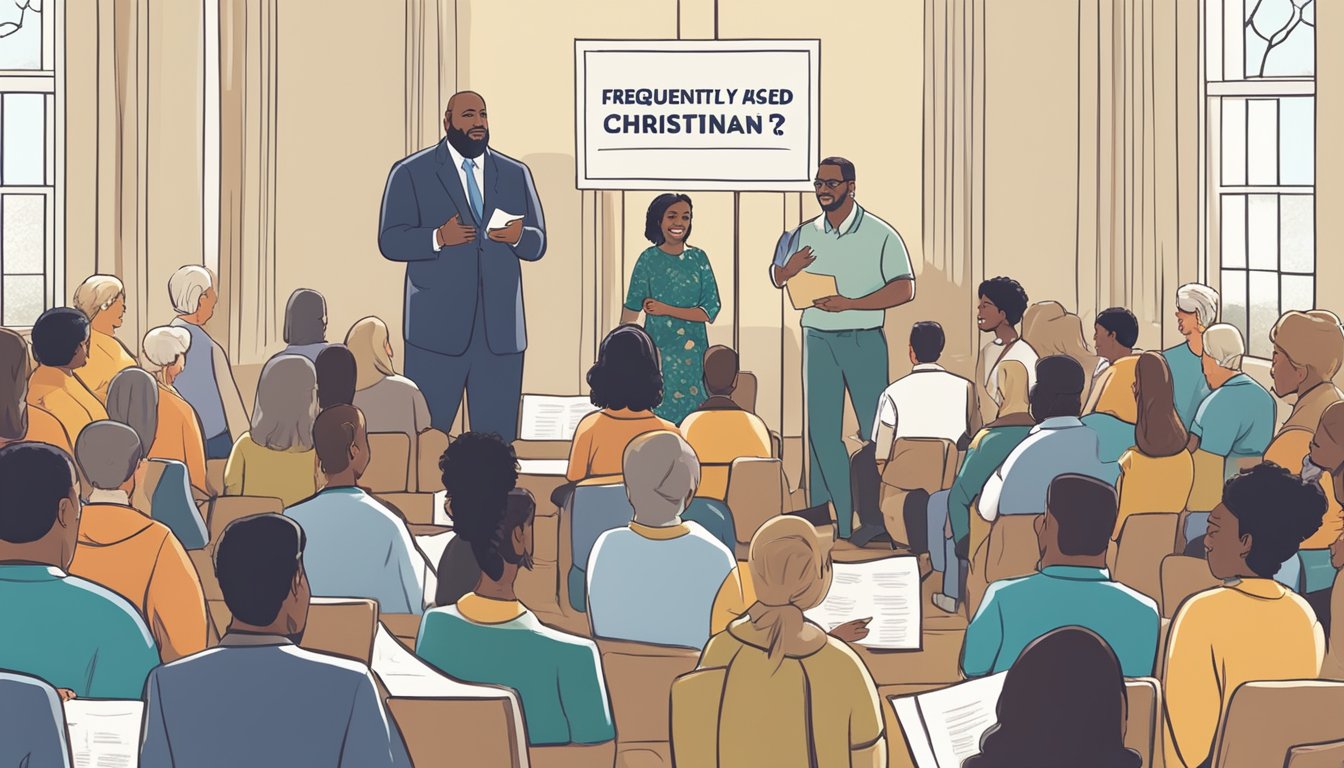Jehovah’s Witnesses are a religious group that is often misunderstood and misrepresented. One of the most common questions asked about Jehovah’s Witnesses is whether they are Christians. This question arises due to the unique beliefs and practices of the group that differ from mainstream Christianity.

Jehovah’s Witnesses consider themselves to be Christians. They believe in God and Jesus Christ, and they base their teachings on the Bible. However, their interpretation of the Bible and their beliefs about certain key doctrines, such as the Trinity and the afterlife, differ from those of mainstream Christianity. This has led to some controversy and debate over whether they can be considered Christians.
Key Takeaways
- Jehovah’s Witnesses consider themselves to be Christians, but their beliefs differ from those of mainstream Christianity.
- Their interpretation of the Bible and their beliefs about key doctrines such as the Trinity and the afterlife set them apart from other Christian denominations.
- The question of whether Jehovah’s Witnesses are Christians is a matter of debate and controversy within the religious community.
Origins and Early History
https://www.youtube.com/watch?v=gQtSXWREf90&embed=true
Charles Taze Russell and the Bible Student Movement

Jehovah‘s Witnesses trace their origins to the Bible Student movement, which was founded in the late 19th century in Pittsburgh, Pennsylvania by Charles Taze Russell. Russell was influenced by the Adventist movement, which emerged in the 1830s and was led by William Miller. Miller predicted that the Second Coming of Christ would occur in 1844, but when this did not happen, his followers became disillusioned.
Russell, however, continued to study the Bible and eventually developed his own interpretation of its teachings. He believed that the end of the world was imminent and that only a select few would be saved. In 1879, he founded the Watch Tower Society, which published a series of books and pamphlets promoting his beliefs.
Formation of Jehovah’s Witnesses
After Russell’s death in 1916, his followers split into several factions, each claiming to be the true successor to his teachings. In 1931, one of these factions adopted the name Jehovah’s Witnesses, which reflected their belief that they were witnesses of Jehovah, the God of the Bible.
Jehovah’s Witnesses believe that they are the only true Christians and that all other religions are false. They reject many traditional Christian beliefs, such as the Trinity and the existence of hell. They also refuse to participate in many aspects of secular society, such as voting, military service, and blood transfusions.
Despite their controversial beliefs and practices, Jehovah’s Witnesses have grown into a global organization with millions of members. They continue to promote their message through door-to-door evangelism and the distribution of literature.
Core Beliefs and Teachings
https://www.youtube.com/watch?v=lE5KQHf8fX0&embed=true
Jehovah’s Witnesses are a Christian denomination known for their evangelism and door-to-door preaching. They believe in the Bible as the inspired word of God and strive to follow its teachings. The following are some of their core beliefs and teachings:
Nature of God and Jesus
Jehovah’s Witnesses believe in one God, Jehovah, who is the creator of all things. They reject the concept of the Trinity, which holds that God is one being in three persons: the Father, the Son (Jesus Christ), and the Holy Spirit. Instead, they believe that Jesus is the Son of God and a separate being from God. They believe that Jesus was created by God and was the first of God’s creations. They believe that Jesus is not God, but a perfect human being who died for the sins of humanity.
The Bible and Its Interpretation
Jehovah’s Witnesses believe that the Bible is the inspired word of God and the ultimate authority on all matters of faith and conduct. They believe that the Bible should be interpreted literally, and that its teachings should be applied to everyday life. They also believe that the Bible is the only source of truth and reject the idea of tradition or other religious texts as authoritative.
Salvation and Afterlife
Jehovah’s Witnesses believe that salvation comes through faith in Jesus Christ and his sacrifice on the cross. They believe that only those who are faithful to God and follow his commandments will be saved. They reject the idea of the immortality of the soul and believe that the dead are unconscious and do not experience anything until they are resurrected. They also reject the idea of hellfire and believe that the wicked will be destroyed, rather than suffer eternal punishment. They believe in a paradise earth where the righteous will live forever.

In summary, Jehovah’s Witnesses are a Christian denomination that believes in one God, Jehovah, and rejects the concept of the Trinity. They believe in the Bible as the inspired word of God and strive to follow its teachings. They believe in salvation through faith in Jesus Christ and reject the idea of the immortality of the soul and eternal punishment in hellfire.
Organizational Structure
https://www.youtube.com/watch?v=RQuY29hPqUA&embed=true
Jehovah’s Witnesses are a Christian denomination with a unique organizational structure. This structure is hierarchical, with the highest level of authority being the Governing Body. Below the Governing Body are the various congregations, which are led by a body of elders.
Governing Body and Congregations
The Governing Body is responsible for overseeing the worldwide activities of Jehovah’s Witnesses. It is made up of a group of men who are considered to be anointed by God and who are believed to be guided by the Holy Spirit. The Governing Body is based at the Watchtower Society’s headquarters in Warwick, New York.
Each congregation is led by a body of elders, which is responsible for the spiritual welfare of the congregation. The elders are appointed by the Governing Body and serve voluntarily. They are responsible for teaching and shepherding the congregation, as well as making decisions on matters such as baptism, disfellowshipping, and other disciplinary actions.
Role of the Watchtower
The Watchtower is a monthly magazine that is published by the Watchtower Society and is used to disseminate information to Jehovah’s Witnesses worldwide. It is considered to be an authoritative source of information on matters of doctrine and practice within the organization.
« Is Mormonism Christian?
Is Halloween a Christian Holiday? Exploring the Origins and Religious Significance »
The Watchtower also plays a role in the organizational structure of Jehovah’s Witnesses. It is used to provide guidance and direction to the various congregations and to disseminate information on matters such as organizational changes, new policies, and doctrinal issues.
Overall, the organizational structure of Jehovah’s Witnesses is designed to ensure that the teachings of the Bible are followed and that the spiritual welfare of the congregation is maintained. While it may be different from the organizational structures of other Christian denominations, it is an integral part of the faith and is considered to be an important aspect of the worship of Jehovah.
Worship and Practices
https://www.youtube.com/watch?v=MIWezNEoPqo&embed=true
Jehovah’s Witnesses share many beliefs with Christians, but they also have some distinct practices and customs. In this section, we will explore some of the key aspects of their worship and practices.
Meetings and Preaching

Jehovah’s Witnesses meet regularly at Kingdom Halls to worship and study the Bible. Meetings typically include singing, prayer, and a talk or lesson. They also engage in door-to-door evangelism, which they believe is a key part of their faith. They see it as their duty to share their beliefs with others and to help people learn about God’s Kingdom.
Baptism and Evangelism
Jehovah’s Witnesses believe that baptism is a symbol of a person’s dedication to God and their acceptance of Jesus Christ as their savior. They are baptized in the name of Jesus and believe that this is the only valid form of baptism. They also believe that evangelism is a key part of their faith and that it is their responsibility to share their beliefs with others.
Observance of Holidays and Customs
Jehovah’s Witnesses do not celebrate holidays such as Christmas and Easter, as they believe that these customs have pagan origins and are not consistent with true Christian teachings. They do, however, commemorate the death of Jesus Christ with an annual observance called the Memorial. They also place a strong emphasis on family life and moral values, and they believe that living a clean and moral life is an important part of their faith.
In summary, Jehovah’s Witnesses have some distinct practices and customs that set them apart from other Christian denominations. They place a strong emphasis on evangelism, reject certain holidays and customs, and have their own unique beliefs about baptism and worship.
Jehovah’s Witnesses and Christianity
https://www.youtube.com/watch?v=_gZe6BCuCa4&embed=true

Jehovah’s Witnesses are a Christian denomination that is known for their door-to-door evangelism and their rejection of certain mainstream Christian beliefs. While they consider themselves to be Christians, their beliefs differ from those of mainstream Christianity in several ways.
Comparison with Mainstream Christianity
One of the key differences between Jehovah’s Witnesses and mainstream Christianity is their rejection of the doctrine of the Trinity. While mainstream Christians believe that God is one being consisting of three distinct persons (the Father, the Son, and the Holy Spirit), Jehovah’s Witnesses believe that God is a single person, Jehovah, and that Jesus Christ is a separate, lesser being.
Jehovah’s Witnesses also reject the concept of the immortal soul, which is a core belief of many Christian denominations. They believe that the soul is not a separate entity that survives after death, but rather that it is simply the life force that animates the body.
Beliefs on Jesus Christ’s Role
Jehovah’s Witnesses believe that Jesus Christ is the Son of God, but they reject the idea that he is God himself. They believe that Jesus was created by God and that he is subordinate to him. They also believe that Jesus’ death was a ransom sacrifice that was necessary to atone for the sins of humanity.
In addition to their beliefs about Jesus Christ, Jehovah’s Witnesses also place a strong emphasis on faith and works. They believe that faith alone is not enough for salvation, but that good works are also necessary. They also reject the idea of predestination, believing that each person has the free will to choose whether or not to follow God.

Overall, while Jehovah’s Witnesses share some beliefs with mainstream Christianity, their rejection of certain key doctrines and their unique beliefs about Jesus Christ and salvation set them apart as a distinct Christian denomination.
Public Perception and Criticism
Jehovah’s Witnesses are often subject to criticism and controversy due to their beliefs and practices. This section will explore some of the major criticisms and controversies surrounding the religion.
Controversies and Legal Challenges
Jehovah’s Witnesses have faced legal challenges in various parts of the world, including in the United States. In some cases, these legal challenges have been related to their refusal to accept blood transfusions, which is based on their interpretation of biblical teachings. Jehovah’s Witnesses believe that the Bible prohibits the consumption of blood, and as such, they do not accept blood transfusions even in life-threatening situations. This has led to legal challenges in some cases, with courts sometimes intervening to order medical treatment against the wishes of the patient or their family.
Accusations of Being a Cult
Jehovah’s Witnesses have also been accused of being a cult by some critics. This accusation is often based on the religion’s strict adherence to its beliefs and practices, as well as its insular nature. Jehovah’s Witnesses are known for their door-to-door evangelism and their reluctance to associate with non-members. This has led some to accuse the religion of being a cult that brainwashes its members and isolates them from the rest of society.

According to a 2016 survey by the Pew Research Center, Jehovah’s Witnesses are one of the most religiously diverse groups in the world, with a presence in 240 countries. However, the religion has faced criticism and controversy in many parts of the world, including in the United States. Despite this, Jehovah’s Witnesses continue to attract new members and maintain a sizable following worldwide.
Family Life and Social Issues
Jehovah’s Witnesses place a strong emphasis on family life and believe that strong families are essential for a happy and fulfilling life. They believe that the family unit is the foundation of society, and that a healthy family life is essential for the well-being of individuals, as well as the wider community.
Marriage and Child Rearing
Jehovah’s Witnesses view marriage as a sacred union between a man and a woman, and believe that it is a lifelong commitment. They believe that the Bible provides guidance on how to maintain a happy and successful marriage, and that couples should work together to build a strong and lasting relationship based on mutual love, respect, and trust.
Jehovah’s Witnesses also place a strong emphasis on child rearing, and believe that parents have a responsibility to raise their children in a loving and nurturing environment. They believe that parents should teach their children Bible principles and help them to develop a strong moral compass that will guide them throughout their lives.
Stance on Politics and Military

Jehovah’s Witnesses are politically neutral and do not participate in any form of political activity. They believe that their allegiance is to God’s Kingdom, and that it is not their place to get involved in the affairs of worldly governments. They also do not serve in the military, as they believe that war is contrary to God’s will.
Jehovah’s Witnesses believe that Christians should conduct themselves in a loving and peaceful manner, and that they should strive to be good citizens and law-abiding members of society. They believe that by living according to Bible principles, they can make a positive contribution to their communities and help to promote peace and harmony.
End Times and Eschatology
https://www.youtube.com/watch?v=TcRy-Sm4B24&embed=true
Beliefs About the Last Days
Jehovah’s Witnesses believe that we are currently living in the “last days” of the current system of things. They believe that these last days began in 1914, when Jesus Christ was installed as King of God’s Kingdom in heaven. They also believe that the end of the world as we know it is imminent, and that God will soon destroy all wickedness on earth and usher in a new paradise earth.
Jehovah’s Witnesses believe that the events leading up to the end of the world will include a time of great tribulation, during which true Christians will be persecuted. They believe that only those who remain faithful to God and endure to the end will be saved. Jehovah’s Witnesses also believe that only a small number of people, known as the “anointed remnant,” will go to heaven to rule with Christ, while the majority of faithful Christians will live forever on earth.
Teaching on the Millennial Kingdom

Jehovah’s Witnesses believe in a literal 1,000-year reign of Christ on earth, which they refer to as the “Millennial Kingdom.” During this time, they believe that Satan will be bound and unable to influence mankind, and that the earth will be transformed into a paradise. Jehovah’s Witnesses also believe that during the Millennial Kingdom, the dead will be resurrected and given a chance to learn about God and his purposes.
Jehovah’s Witnesses do not believe in the doctrine of the Trinity, which teaches that God is a triune being consisting of three co-equal and co-eternal persons: the Father, the Son, and the Holy Spirit. Instead, they believe that Jesus is a created being, the first and only direct creation of God, and that he is inferior to God in every way. They also believe that Jesus’ death provided a ransom for mankind, allowing people to be reconciled to God and have the hope of eternal life.
Jehovah’s Witnesses meet for worship in buildings called Kingdom Halls, where they study the Bible and sing hymns. They do not celebrate holidays such as Christmas and Easter, which they believe have pagan origins, and they do not participate in political activities or serve in the military.
Education and Outreach
Role of Education Within the Faith
Education is highly valued within the Jehovah’s Witness faith. The Watch Tower Bible School of Gilead, located in South Lansing, New York, is a prime example of the importance placed on education. The school was established to train Jehovah’s Witness missionaries to spread the faith globally.

Jehovah’s Witnesses believe that education should be viewed objectively and that higher education can lead to moral and spiritual dangers. They base their view of education on the principles found in the Bible and each Witness uses their Bible-trained conscience to determine how to apply godly principles.
Jehovah’s Witnesses encourage their members to pursue education, but also to maintain a balance between their education and their faith. They believe that education should help individuals become useful members of society, but not at the expense of their spiritual well-being.
Missionary Work and Global Expansion
Jehovah’s Witnesses are known for their missionary work and global expansion efforts. They have a strong commitment to spreading their message to as many people as possible. Missionaries are trained at the Watch Tower Bible School of Gilead to effectively communicate their beliefs to people around the world.
Jehovah’s Witnesses believe that their message is important for all people to hear, and they have translated their literature into over 1,000 languages. They are also known for their door-to-door outreach, where they share their message with people in their local communities.
Overall, education and outreach are important aspects of the Jehovah’s Witness faith. They place a strong emphasis on education, while also recognizing the importance of missionary work and global expansion.
Contemporary Issues and Developments

Modern Challenges and Adaptations
Jehovah’s Witnesses have faced many contemporary challenges in recent years. One of the most significant challenges has been the changing social and cultural landscape that has made it difficult for them to maintain their traditional beliefs and practices. In response to these challenges, Jehovah’s Witnesses have adapted their approach to evangelism and outreach, using modern technology and social media to spread their message and connect with people around the world.
Another challenge that Jehovah’s Witnesses have faced is the issue of unity within their organization. While Jehovah’s Witnesses share a common set of beliefs, there are often disagreements and divisions within the organization over certain issues. To address this issue, Jehovah’s Witnesses have developed a system of internal governance and decision-making that allows for open discussion and debate while still maintaining a sense of unity and cohesion among members.
Growth and Demographics
Despite these challenges, Jehovah’s Witnesses continue to experience significant growth and expansion worldwide. According to recent statistics, there are over 8 million Jehovah’s Witnesses in more than 240 countries and territories around the world. This growth is largely due to the organization’s focus on evangelism and outreach, as well as its emphasis on personal study and reflection.
Jehovah’s Witnesses also have a unique demographic profile, with a higher percentage of women and young people than many other religious groups. This demographic diversity has helped to fuel the organization’s growth and has also contributed to its ability to adapt to changing social and cultural trends.
Overall, Jehovah’s Witnesses remain committed to their core beliefs and values, including the importance of truth, the role of Jesus Christ as savior, and the existence of an eternal life with their creator, Jehovah. While they continue to face challenges and obstacles in the modern world, Jehovah’s Witnesses remain a vibrant and dynamic religious community with a strong commitment to spreading their message of hope and salvation to people around the world.
Frequently Asked Questions
What are the core beliefs of Jehovah’s Witnesses?
Jehovah’s Witnesses believe in one true God, Jehovah, who created everything. They also believe that Jesus Christ is the son of God and that he died for the sins of humanity. They believe that the Bible is the inspired word of God and that it contains the truth about God’s purpose for humanity.
How do Jehovah’s Witnesses view salvation?
Jehovah’s Witnesses believe that salvation is a gift from God and that it can only be achieved by following God’s laws and by having faith in Jesus Christ. They believe that only 144,000 people will go to heaven to rule with Jesus Christ, while the rest of the faithful will be resurrected on Earth to live in a paradise.
What is the stance of Jehovah’s Witnesses on blood transfusions?
Jehovah’s Witnesses do not accept blood transfusions or blood products because they believe that the Bible commands them to abstain from blood. They believe that accepting blood transfusions is a violation of God’s law and that it can lead to spiritual death.
Do Jehovah’s Witnesses celebrate any holidays or special events?
Jehovah’s Witnesses do not celebrate holidays or special events such as Christmas, Easter, or birthdays because they believe that these celebrations have pagan origins and are not supported by the Bible. They do, however, celebrate the annual Memorial of Jesus Christ’s death.
How do Jehovah’s Witnesses differ from mainstream Protestant Christianity?
Jehovah’s Witnesses differ from mainstream Protestant Christianity in several ways. They reject the doctrine of the Trinity, which teaches that God is one God in three persons. They also reject the idea of an immortal soul and believe that the dead are unconscious until the resurrection. Additionally, they believe that the end of the world is imminent and that only those who follow Jehovah’s laws will survive.
What is the Jehovah’s Witnesses’ belief regarding life after death?
Jehovah’s Witnesses believe that the dead are unconscious and do not have any awareness or consciousness after death. They believe that the dead will be resurrected on Earth after Armageddon to live in a paradise. They also believe that only a select few, the 144,000, will go to heaven to rule with Jesus Christ.
















